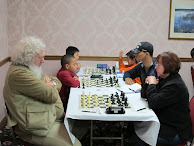Sunday, April 6, 2008
China to Single Mothers: Your Children Do Not Officially Exist
The Chinese government has long maintained that the Communist Party liberated women in 1949 along with the rest of the country. But in an era of rapid modernization, China has lacked anything like a broad current of thought about women’s rights.
“When we argue that a woman owns the uterus, and it’s her right to decide whether to deliver the baby or not, people won’t buy it,” said Yuan Xin, director of psychology at the Consulting Center of Nankai University. “If you are a woman, your personal choice is monitored and supervised by a lot of others, and they expect you to do what everyone else does.”
Welcome to the Collective - may as well be a Borg!
From The New York Times
Single Mothers in China Forge a Difficult Path
By HOWARD W. FRENCH
Published: April 6, 2008
BEIJING — As a young migrant worker, Lei Gailing sought her fortune in China’s fast-industrializing and freewheeling south. She found a steady factory job and a less stable boyfriend, then became pregnant.
The routine course for most women would have been to marry the man or to arrange an abortion. Ms. Lei, who was by then 33 and fiercely independent, did neither. Refusing to marry the man but afraid she might never have a child, she chose to become a single mother.
That decision carried implications that Ms. Lei never fully anticipated, marking her as something of a social outcast in a country that still strictly controls population growth and makes few concessions to women like her.
Today, at 41, Ms. Lei says she has no regrets, even after facing a life of bitter twists and turns: pretending to be divorced at one point to avoid bringing shame on her son and ultimately marrying a much older man in an effort to obtain the basic identification her boy needed to go to school or receive other social services.
For all this, Ms. Lei, who now lives with the older man in Beijing in what she describes as an abusive relationship, said she would do it all over again for her son. “I look at him today, and know it was worthwhile,” she said, tears forming in her eyes. “He is so lovely, I cannot regret it.”
In a society where until quite recently premarital sex was often punished, the issue of single motherhood has been slow to enter the public arena. But now, a new awareness of the issue is raising questions about the status of women in China, as well as other rights issues like the hukou, or residency permit, a central tool of population control passed down from the Maoist era that restricts movement by linking people to the towns of their birth.
. . .
Official statistics on the number of single mothers are unavailable in China. But with premarital sex now commonplace and women’s earning power growing, particularly in the wealthy cities of the east, experts believe their numbers are rising fast, albeit from a small base.
“This is of great significance,” said Li Ling, a professor of arts and sciences at Beijing Language and Culture University. “It’s hard for me to judge other people’s choices, good or bad, but it means a lot that women are making such decisions on their own, as a matter of choice. In Chinese tradition, women don’t have such rights. We are only the bearers of offspring for our husbands’ families.”
In many ways, Xie Jing, 33, a newspaper reporter in Shanghai, is typical of an emerging generation of single mothers who are professionals and whose choices on child-rearing are eased by their financial security.
Ms. Xie said that she became pregnant while she was engaged, but that her fiancé’s ambivalence over the unexpected news prompted her to set her own course. When her former fiancé asked her, “What is the point of having a child if we are no longer together?” she had a ready answer: raising the child alone.
“My quality of life isn’t so bad, so I don’t want to lower myself to staying with another person just for the sake of being together,” Ms. Xie said. “If that means I have to sacrifice a lot, so be it. But I am in a good situation now with my baby, and I’m not willing to lose it.”
Her son was born two years ago in a partly foreign-owned hospital, where registration of the pregnancy with a neighborhood committee — standard in most of China — was not required. Ms. Xie lives with her parents, who are retired and help take care of her boy. To all but her closest friends, she explains that the father is overseas on a three-year assignment. Her son bears Ms. Xie’s family name, and the father was told that if he did not accept legal responsibility as a parent, he would be kept at bay until the boy turned 18.
Asserting herself in this way was made easier by virtue of Ms. Xie’s residence in Shanghai, a wealthy city by China’s standards with relatively liberal provisions for awarding residency permits. “I checked out Shanghai’s Public Security Bureau’s Web site, and discovered an item indicating children born outside of marriage could apply for hukou,” Ms. Xie said. “The staff was mean to me when I applied, but there were written rules guaranteeing the rights of my child, so there was nothing they could do to prevent me.”
Every province and major city has some leeway in how it applies those rules. But for peasants and working-class mothers without much education, money or standing, choices can seem limited.
Zhong Yu, 23, a music teacher in Chongqing, one of China’s largest cities, said she considered getting an abortion when she recently discovered that she was pregnant. Abortion is legal, widespread and freely available in China, but she could not afford the hospital fees. She hid her situation from her family, and by the time she had saved enough money, she was five months pregnant — too late, she believed, to end the pregnancy safely.
Today Ms. Zhong calls the father, who has no fixed job, a “vagrant” and says she was silly to have become involved with him. “But when I saw my child, I thought no matter how hard my life will be, I will bring him up,” she added.
Ms. Lei, the mother in Beijing, also had few resources and, partly because of that, a difficult path. After returning to her village to give birth, she went to Beijing to look for work and a husband, leaving her son behind with her mother. But fearing he would be taunted as a bastard in the village, she brought him with her to Beijing when he reached school age.
In the capital, Ms. Lei faced new problems. Without a father she could not establish a hukou, or residency permit. In 2006, Ms. Lei described her plight on the Internet, drawing the interest of a Chinese journalist, who wrote about her. Soon afterward, men began contacting her with marriage inquiries.
She agreed to meet one of them one day under a highway overpass. He had described himself as 60, but looked at least 10 years older, she said. The man, a retired and widowed engineer with a mentally disabled son, said he needed an heir to continue his family line, and she needed the help of a man to register her son so he could attend school. Out of their mutual needs came a marriage of convenience.
“He needed a kid and I needed a home,” Ms. Lei said. “My kid needed to go to school, so we pooled together a family. There was no contract of any kind.”
They married, but their hasty pact quickly unraveled. The man balked at registering the boy in his name out of fear he could be breaking the law. Now, Ms. Lei said, he is cold toward her child and mean to her. For now, the boy, Jirong, 7, attends a neighborhood school that has looked the other way over his lack of a residency permit.
“Most people in this situation would have given away their child to others for adoption,” Ms. Lei said. “Almost no one would choose to bring up the child on her own.”
Subscribe to:
Post Comments (Atom)



































No comments:
Post a Comment